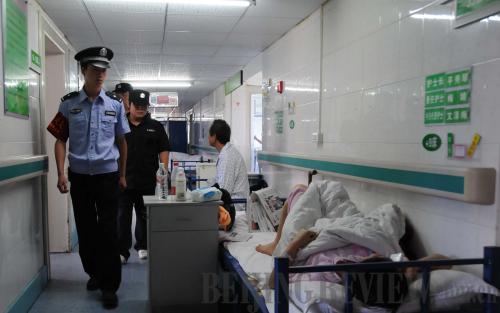|
 |
|
WARD SECURITY: Police officers patrol the Affiliated Hospital of Guiyang Medical University in Guizhou Province on July 12, 2012 (HU XING) |
A number of recent cases of violence against medical staff have brought the long-standing issue of tension between patients and doctors into the spotlight once more.
On March 21, a patient attacked three doctors with a 20-cm-long knife at the Fifth People's Hospital of Shanghai. The 50-year-old man, who had been diagnosed with lymph cancer, was discharged from the hospital on March 17. His motive is under investigation, according to the police.
There have been a slew of similar headline-making incidents in which patients threatened, humiliated or harmed doctors.
On March 5, a doctor at the Chaozhou Central Hospital in south China's Guangdong Province was forced into a public parade by the relatives of a patient whose life he failed to save.
Earlier in the month, a couple, who were both government officials, were punished for beating and ultimately paralyzing a nurse at the Nanjing Stomatological Hospital in east China's Jiangsu Province.
Cases of doctors being attacked by patients or their families have increased, worsened and become increasingly intolerable in recent years, said Zhang Fan, an official with the Information Department of the Chinese Medical Doctor Association (CMDA).
According to the association's research, disputes between doctors and patients often involved protests outside hospitals in the past. But in recent years, some disgruntled patients have become violent and have taken to beating up or even killing medical workers.
Wang Zhong, Vice President of Tsinghua University Hospital in Beijing, said that the assaults against medical staff make them fearful for their lives, which ultimately has a negative impact on medical services.
Rising medical disputes
China has about 1,000 top-tier public hospitals and each treats more than 10,000 outpatients daily. In many of these hospitals, patients often wait in long lines for hours before seeing a doctor for just a few minutes.
Many patients have also complained about the high costs of medical treatment, reportedly caused by some hospitals' overemphasis on making profits. "Some doctors exaggerate patients' illnesses so that they can prescribe medicine indiscriminately, or recommend unnecessary physical checks, which is part of the reason for this discontent among patients," said Guo Yufen, Deputy Director of the Commission of Health and Family Planning of northwest China's Gansu Province.
A sample survey conducted by the Chinese Hospital Association (CHA) from December 2012 to July 2013 showed that the annual average number of assaults on doctors per hospital increased from 20.6 in 2008 to 27.3 in 2012. The survey polled the staff and patients at 316 hospitals.
Meanwhile, about 70,000 medical disputes were reported nationwide in 2013, according to official statistics.
Along with rising doctor-patient tensions, medical workers' reported career satisfaction has reached a new low, researches have found.
The survey conducted by the CHA showed that nearly 40 percent of responding doctors said that they had considered leaving the medical profession to search for alternative employment.
"If this sort of violence continues, doctors won't fully devote themselves to saving lives. We are not respected or protected. Who will save us while we are saving others?" asked Yu Keyi, a physician at Peking Union Medical College Hospital in Beijing.
In fact, not only are doctors unhappy with their jobs, they are also discouraging their children from following in their footsteps.
According to another survey conducted by the CMDA at hospitals across 11 provinces in 2011, 78 percent of the 3,700 doctors it surveyed said that they did not expect their children to take to their profession in the future. Many of the doctors surveyed cited growing tensions between patients and doctors as well as the escalating violence in hospitals across the country in recent years.
| 